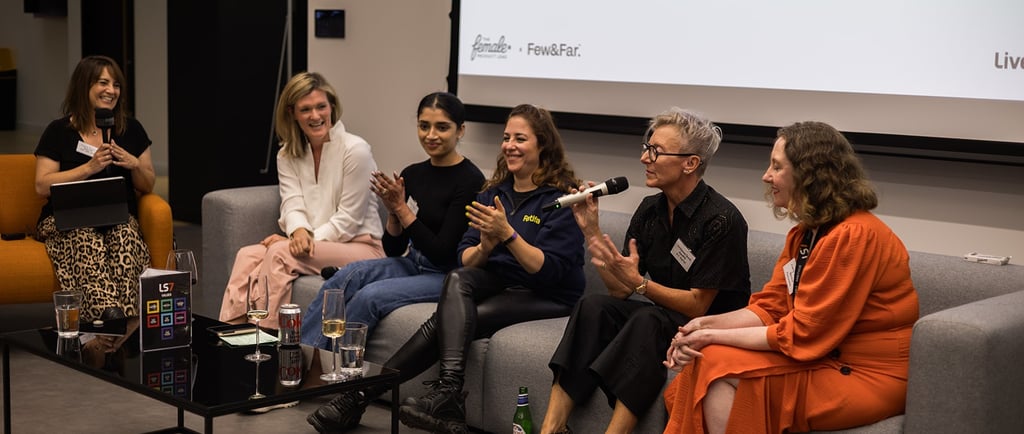Normalising Peri/Menopause
A collection of insights from our recent perimenopause / menopause event hosted by LiveScore Group in Golden Square London.
Maddie Manoliu
3/6/20256 min read


We’ve had a great experience organising the peri/menopause event. We definitely want to thank everyone who participated and made it a reality! The panellists were insightful and fun, the conversations were flowing (thanks to all amazing participants) and everyone left after enjoying some drinks and nibbles! In the Female Product Lead book, this definitely sounds like a win.
So, without further ado, let’s jump straight into the insights, stories and educational resources that stood out to us.
First things first, what is peri/menopause and why should I care?
According to Dr Fionnuala Barton, menopause is the cessation of periods for at least 12 consecutive months. Menopause can occur naturally or after medical treatments affecting the reproductive system or general autoimmune issues. Perimenopause starts with irregular cycles and ends once the last period was more than 12 months ago.
Symptoms of peri/menopause are often vague and can worsen existing health issues, making diagnosis difficult. Common signs include hot flashes, urinary and skin changes, mental health shifts, and sleep problems. For a full list of symptoms and helpful resources, you can always check the NICE (National Institute for Health and Care Excellence) website for up-to date guidance about peri/menopause. Since symptoms can be easily mistaken for other conditions, it’s important to rule out issues like nutritional deficiencies or more serious illnesses.
Nowadays, treatments for peri/menopause can include HRT (hormone replacement therapy), SSRIs/SNRIs, as well as basic self-care such as good nutrition and exercise. Unfortunately, many GPs still struggle to diagnose and treat peri/menopause due to time constraints or knowledge, so self-advocacy is key. Since you know your body best, you will need to speak up and continue to advocate for your medical needs, which may not feel so comfortable. A service like Hertility allows you to take matters into your own hands and get specific ‘health-cheat sheets’ that you can take to your GP so they can help refer you further for treatments.
Aside from treatments and how to get medical help, Kerry Northcliffe of FullBeam (a consultancy focused on counselling and workplace well-being initiatives, including education around the impacts of menstruation) also emphasised the importance of workspace attitudes and policies around menopause. She encouraged all participants to keep involving male allies in all of these important workplace policy discussions, since sharing different experiences can be the only way to make inclusive workplace policies. Most importantly, she shared with us that one of the most ‘difficult’ decades for women is between 45-55, with the rate of suicides being the highest for this group. Kerry reminded us that this grim statistic is not necessarily that surprising, especially knowing how debilitating untreated/undiagnosed peri/menopause is and how underdeveloped peri/menopause or women’s health issue policies are within the workplace.
Perimenopause / Menopause - facts or fiction?
Before we dive into more specific/actionable steps, let’s recap the many myths, misconceptions and policy missteps related to peri/menopause:
Dr. Barton clued us in that menopause doesn’t only affect the 45-55 age group (a common misconception). Menopause and perimenopause affect a wide age-range with over 60 symptoms, often requiring repeated doctor visits and careful monitoring to rule out other health issues.
The economic impact of menopause is notoriously tricky to quantify, but Katherine Church drove home the reality from the few numbers we do have. At least 1 in 10 women, and 1 in 8 NHS staff, leave work due to menopause; 37% take time off for symptoms, but only 7% cite menopause as the reason, making true impact hard to track.
Our moderator Katie reminded us that while menopause isn’t protected under current UK law, instead women are fighting back utilising legal cases for mental health impact, which is. These types of cases have quadrupled since 2022, and a new bill may soon require large employers to publish menopause policies (gov.uk article here, for the curious)
Katie shared that just at the corporate level, replacing each woman who leaves due to peri/menopause costs UK companies around £30,000, with huge non-monetary losses too (as you probably guessed, know-how and talent are hard to quantify). There is also a 10–30% drop in women’s earnings after menopause, totalling over £1.5bn in economic losses. Fertifa created an ROI calculator to try and embolden companies into thinking about these costs more clearly.
Another interesting (but despair-inducing) fact is that only five of the FTSE 100 CEOs are women, with many senior women moving to non-executive roles, highlighting ongoing gender disparities in leadership.
Government cuts to women’s health funding have made NHS care less accessible, leaving many women struggling to find affordable, effective treatment and accurate information about peri/menopause. Tulsi Patel, Hertility’s Director of Product, Tulsi noted that early, exaggerated reports about HRT treatment risks created lasting misinformation around menopause treatments. Despite these concerns being disproved, outdated fears still influence both the public and some healthcare providers.
So, with these scary stats in mind (and emboldened by our feminine rage-thank Katherine Church for this visual, haha)—what can we do? As some of the participants noted in the Q&A portion of the event, how can we make sure that we help as many women as possible—especially those who might be disenfranchised/unable to access information easily?
What does a good workplace look like?
One of the key aspects that was discussed on the panel was how employers can help women by creating effective peri/menopause related HR policies. Kerry shared candid stories about boldly bringing these conversations front and centre when it comes to difficult discussions with managers/bosses, and the panellists discussed benefits and challenges of creating effective (and most importantly individual-based) peri/menopause HR policies.
Celine Crawford’s takeaway as founder of Fertifa was that companies should just start by creating a policy—even if it’s not perfect (or particularly flashy to begin with). If one doesn’t exist yet, make a start. Let it be something you iterate on. Check that it includes a personal plan for each of your people, including their partners and allies within the organisation. Finally, companies should look at offering financial support and allowances for menopause adjustments.
There are various degrees through which work environments can provide support (and they don’t all have to be costly).
Culture: Normalise having open conversations about health at work—we are so much more than our jobs and it’s ok to not not be able to give 100% all of the time.
Adapt quickly: Since peri/menopause can affect individuals differently, it’s important to keep a flexible mindset and allow feedback from affected employees, adapting to how things shift for them in their experience.
Physical workplace adjustments: Providing simple workplace adjustments like fans, quiet areas, and healthy snacks can improve comfort and help manage some of the symptoms of peri/menopause.
Flexible working: Offering flexible working options can help women with managing their workload based on how well they feel day-to-day or throughout the day.
Provide support networks: Having colleagues to talk to (perhaps people trained in mental health first aid) could provide additional lines of support on top of any written information you might provide on internal sites, Slack channels and anything in-between.
Is there anything I can do?
As you can probably imagine, the theme of the event was—how can we close the information gap about peri/menopause?
We need to educate ourselves as women, but also our partners, families and employers need to step up and educate themselves on perimenopause and menopause and proactively work to provide support where it is most impactful. This might sound like a daunting task—but we had great pointers that could help you and your organisation to make a start.
Don’t be afraid of peri/menopause: Talk about it with your friends and family.
Be loud and be proud: Don’t feel like it’s not ok to talk about your body, your experience and your reality. It’s normal, and it’s important.
Be a listener: Let people share without shame, and practice active listening.
Create a policy, get started: Anything is better than nothing, there are good free policy templates online.
Channel the rage: Let your righteous anger drive you to action and make waves in your community. Don’t turn the rage inward by thinking something is wrong with you.
Look after yourself: Don’t forget that you deserve to be safe and cared for, and it's ok to talk about your struggles with your employer, family and friends.
Get informed: Think about where to get informed and be mindful of misinformation and outdated perception and education.
Remember there is an even greater need and opportunity to reshape the conversation around policies and best practices in society in general. While we focused a lot on the workplace/corporate side of things, we shouldn’t forget about ensuring that our actions can help everyone gain access to this information (not just people in full-time work, or in corporate settings).
Last but not least, everyone can contribute to creating safe spaces to have those conversations, whether at the workplace or in their personal lives, ones that enable us to look past the discomfort while respecting each other’s tolerances and boundaries.
